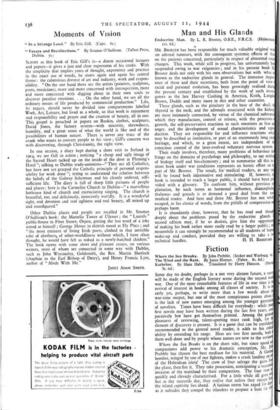• •
MR. BROSTER has been responsible for much valuable original w* on adrenal tumours, with the consequent systemic effects of thtt on the patients concerned, particularly in respect of abnormal sexui changes. This work, while still in progress, has unfortunately b suspended owing to war exigencies ; and in his present book 3, Broster deals not only with his own observations but with what known as the endocrine glands in general. The immense import. ance of these and their secretions, both from the point of view a racial and personal evolution, has been growingly realised dur the present century and established by the work of such inve, gators as the late Harvey Cushing in America, Keith, Lang! Brown, Dodds and many more in this and other countries.
These glands, such as the pituitary in the base of the skull, thyroid in the neck, and the adrenals associated with the kidnq are most intimately connected, by virtue of the chemical ;substanc which they manufacture, control or release, with the processes growth, the self-preservative reactions to such emotions as fear anger, and the development of sexual characteristics and rep duction. They are responsible for and influence reactions whi may be described as instinctive, or part of an enormously long ra heritage, and which, to a great extent, are independent of conscious control of the later-evolved voluntary nervous system.
Theft study involves, therefore, many problems of behaviour fringe on the domains of psychology anek philosophy, to say noth of biology itself and bio-chemistry ; and to summarise all this in short book under war conditions represents an heroic effort on part of Mr. Broster. The result, for' medical readers, at any will be found both informative and stimulating. If, however, book is intended to reach a larger public, it should have been p vided with a glossary. To confront him, without previous a planation, by such terms as hormonal influence, dianceph thalamus and gonads is to demand a good deal from the n medical reader. And here and there Mr. Broster has not who, escaped, in his choice of words, from the pitfalls of compression perhaps haste.
It is abundantly clear, however, that he has read and thou deeply about the problems posed by the endocrine glands. second edition may, if he so desires, give him the opportu of making his book rather more easily read by a larger public; meanwhile it can strongly be recommended to all students of h make-up and conduct, provided they are willing to take a f


























 Previous page
Previous page